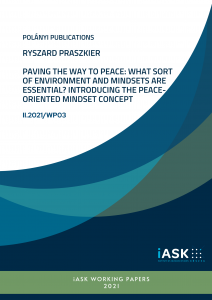Research & Studies
 About the Author
About the Author
Ryszard Praszkier (Poland) is a researcher at the Institute for Social Studies, University of Warsaw and a lecturer at the Polish Academy on the Psychology of Leadership. He is interested in the properties of social networks that support profound, peaceful social transitions, e.g., the cases of the Polish underground Solidarity and the American Civil Rights Movement. He worked as an international staff training director for Ashoka, Innovators for the Public for over 16 years. During the 1980s, he participated in the peaceful Polish underground Solidarity movement and for example publicized under a false name an illegal manual for Solidarity activists “How to Survive Police Interrogation.” He was a consultant for Solidarity candidates for the first free elections in 1989; in the early 1990’s was a co-founder of several grassroots NGO’s in which he is still active.
Abstract
Addressing peace and conflict issues is entering a field with well-established knowledge (e.g., Barash & Webel, 2014; Diehl, 2006; Dugan, 1989; Jeong, 2018; Paffenholz & Reychler, 2007). Narrowing down, the premise of looking at peace and conflict through the lens of dynamical theory is a recent focus of the 21st century (see: Lemos et al., 2013, 2018; Taylor et al., 2004; Vallacher et al., 2010, 2012). Moreover, the dynamical approach sheds some light on the crucial role of the conflict environment (Bar-Tal, 2007; Bartoli et al., 2010; Lederach, 1996, 2003; Miall, 2004).
However, there is a gap in analyzing peace and conflict dynamics from the point of view of the psychology of peacemakers. The key question is what sort of mindsets are aimed at restoring, sustaining, or preventing peace.
This article characterizes the manifestation of peace/conflict dynamics and provides an overview of the modern approach to analyzing the peace/conflict milieu. This leads to the concept of circumventing the essence of a conflict and, instead, identifying alternative peace-enforcing attractors (e.g., social capital). Next, the concept of the power of “weak” influence, i.e., cultural and economic bottom-up initiatives that develop peace-sustaining ambience, is presented.
Finally, the notion of the peace-oriented mindset (POM) of people contributing to peacemaking is introduced, illustrated by real-life examples and followed by proposing methods for its assessment.
Keywords: Conflict; peace; dynamical approach; complex systems; prevention
II.2021/WP03Download